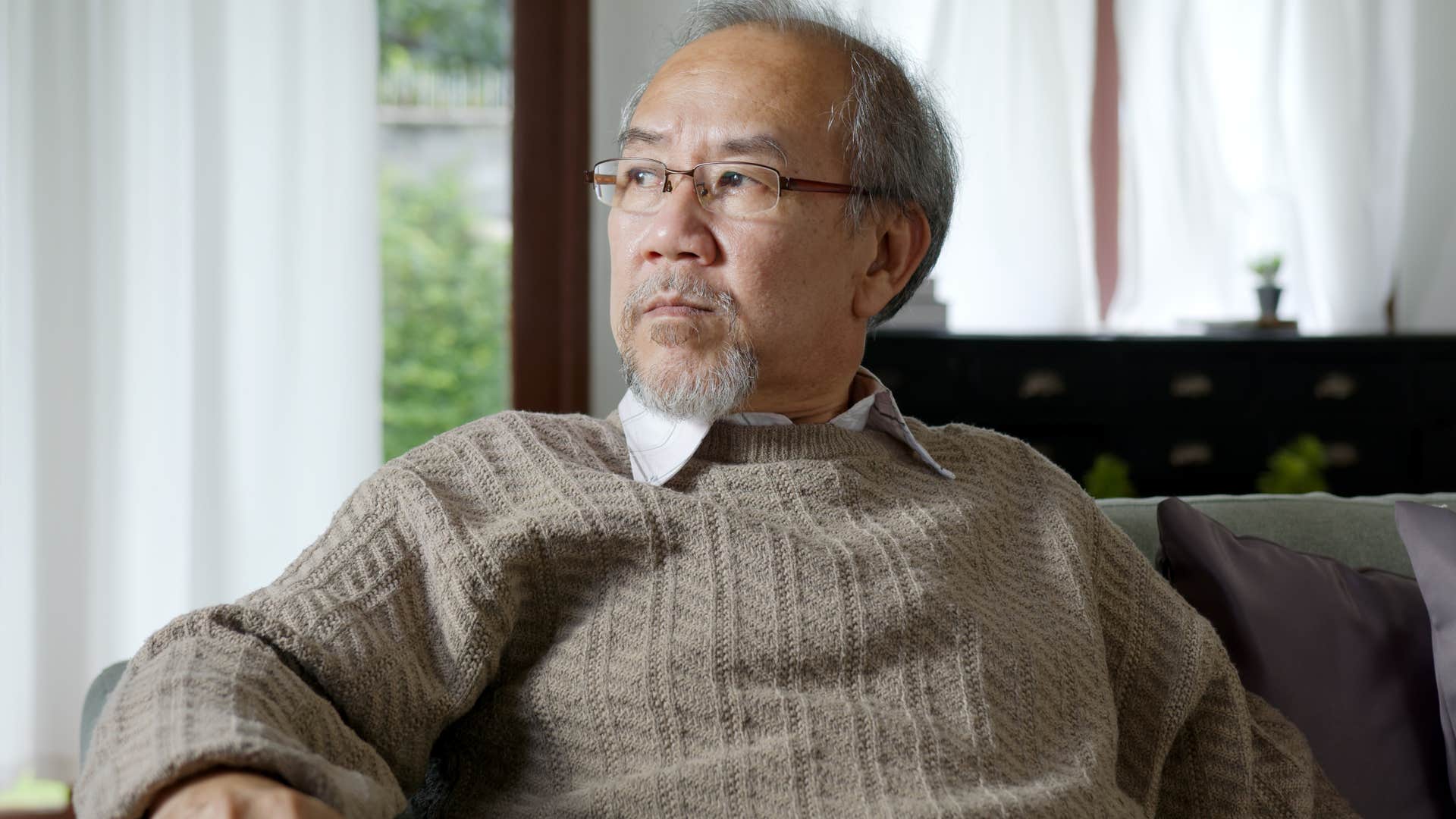11 Things A Husband Should Never Feel Forced To Do For His Wife
Healthy marriages are built between two people, not one overbearing partner.
 YAKOBCHUK VIACHESLAV | Shutterstock
YAKOBCHUK VIACHESLAV | Shutterstock While it's natural for long-term relationships to go through many different stages of discomfort, a truly healthy marriage revolves around trust and open communication. When one partner gets to the stage of feeling controlled by their spouse, forced to do things and act in a certain way to appease the other, it's not just trust that's sabotaged, but feelings of understanding and respect that are essential in a healthy relationship.
In addition to other behaviors like gaslighting, blame-shifting, and overstepping boundaries, like clinical psychologist Lori Lawrenz argues are key tactics for a controlling partner, there are several other things a husband should never feel forced to do for his wife. From emotional expectations to household responsibilities, it's essential that open communication sparks relationship roles and standards, rather than one sole partner simply telling the other what to do.
Here are 11 things a husband should never feel forced to do for his wife
1. Take the blame in arguments
 Chay_Tee | Shutterstock
Chay_Tee | Shutterstock
Psychotherapist Tonya Lester, LCSW argues that blame-shifting behavior often stems from narcissistic tendencies in a partner. For example, a husband brings up a point of tension in the relationship and immediately he's forced to comfort his wife, rather than deal with the issues at hand with open honest communication.
This cycle of blame-shifting can be detrimental both for relationship health and the emotional health of both partners, sparking more stress, anxiety, and uncertainty in everyone's life. When a partner resorts to playing the victim, they not only contribute to a toxic atmosphere where their spouse is consistently unheard, but also growing resentful under the burden of misguided accountability.
2. Isolate himself from his friendships
 MAYA LAB | Shutterstock
MAYA LAB | Shutterstock
Many people with an insecure attachment style struggle with dividing their time between their personal relationships, like friendships and family, and their romantic partners, but they also find it difficult to comfortably cope with their partner's personal lives, as well.
Like a study from Child Development suggests, people with insecure attachments often live in toxic cycles of loneliness — growing disconnected with their spouses in adulthood from behaviors like encouraging them to spend all their time and energy on a marriage.
Even if it's something as subtle as an eye roll, cutting off their friendships or investing little time in other connections is one of the things a husband should never feel forced to do for his wife, no matter how insecurely attached they feel in a marriage.
3. Accept disrespectful behavior or unnecessary critique
 Goksi | Shutterstock
Goksi | Shutterstock
While disrespect can take many forms in a marriage, from constant nagging to overstepping boundaries, the nature of its consequences for partners is what makes it so harmful for long-term relationships.
According to psychologist Sabrina Romanoff, disrespectful partners can spark a range of uncomfortable emotions in their partners, from insecurity to uncertainty and even resentment that grows into anger and disconnection. While it's possible to overcome disrespectful tendencies in a marriage, tolerating it is one of the things a husband should never feel forced to do for his wife.
With the right communication style and conflict resolution skills, nobody should be simply tolerating misbehavior in a marriage, but rather, addressing toxic moments as they arise.
4. Give up his hobbies and interests
 Nenad Cavoski | Shutterstock
Nenad Cavoski | Shutterstock
According to Rebecca Williams, LMFT, partners who have their own separate hobbies and interests tend to bring more richness and fulfillment to their relationships.
By spending time apart, focusing on building their individuality and fulfilling their own personal needs, they can show up better for their partner when they do come together.
However, many partners with insecure attachment styles or overbearing tendencies in a marriage encourage their partners to spend all their time and energy on them, cutting out hobbies and friendships that divide their time.
A truly healthy partner would never force their spouse to sacrifice something that brings them genuine joy, even if it's just a hobby.
If it becomes a problem of quality time, where a hobby is taking up too much time in a partner's life, healthy communication can help marital couples to resolve that problem together, rather than simply expecting someone to completely cut it out.
5. Spend every second of the day together
 Perfect Wave | Shutterstock
Perfect Wave | Shutterstock
Quality time doesn't always look the same for every relationship and at different stages in a couple's life, the way they prioritize it in a way that works for everyone involved is incredibly important.
Whether it's planned dates, like experts argue are important for long-term partners, or recharging together after a long day, quality time helps couples to bond, communicate, and meet each other's needs.
However, spending 100% of your time with a partner isn't always the "quality" we're expecting, and can actually be detrimental to each person's emotional health.
Like relationship experts from Anchor Light Therapy Collective suggest, partners in the healthiest marriages often split their time 70/30 — spending 70% of their time together and the other 30% away doing other things.
Expecting a partner to be with you or available 100% of the time is one of the things husbands should never feel forced to do with their wife. And when their partner does try to spend every waking moment together, it can cause resentment to build.
6. Make big life decisions to appease her
 Rawpixel.com | Shutterstock
Rawpixel.com | Shutterstock
When you enter into a marriage, you're no longer making big life decisions that solely impact you. To avoid resentment and unproductive conflict in long-term relationships, couples should be making decisions together, having multiple conversations before they jump into a new life stage like starting a family or making a big investment.
When a partner expects their spouse to simply agree with and encourage all of their big life decisions without communication, it's no longer a collaborative relationship, but rather one partner controlling the narrative of their life together.
7. Suppress his opinions and emotions to avoid conflict
 PeopleImages.com - Yuri A | Shutterstock
PeopleImages.com - Yuri A | Shutterstock
While many men are societally pressured to conceal their emotions and avoid vulnerability, many women can fall victim to perpetuating similar expectations in their heteronormative relationships, encouraging their husbands to be less emotional.
Not only does this build resentment and mistrust in a marriage, it can cause inherent disconnect, as one partner is more likely to express their emotions and receive reassurance while the other's needs go consistently unmet.
A truly loving and respectful wife would work to unlearn her misguided stigmas around vulnerability if she truly cared about meeting her spouse's emotional needs, to the same degree she expects him to meet hers.
8. Always be the protector
 Chay_Tee | Shutterstock
Chay_Tee | Shutterstock
Men and women do tend to have different expressions of love and perceptions of their relationships, with male partners valuing acts of service, sacrifice, and providership above the intentional emotional expression that women are more drawn to.
While some men desire to be the "protector" or "provider" of their spouse in a relationship, having to assume that role all the time can be emotionally taxing, even for a man that's not incredibly vulnerable all of the time.
Feeling expected to always assume a specific role in a relationship is something a husband should never feel pressured to do for his wife, as it often cultivates an unbalanced relationship dynamic and lingering resentment between partners.
9. Never speak about past relationships
 Fast-stock | Shutterstock
Fast-stock | Shutterstock
While it's often uncomfortable to speak about past relationships with a new partner, especially if there's specific trauma or emotions associated with that person, it's necessary to communicate about these things to bond, learn, and grow in a marriage.
One of the things a husband should never feel forced to do for his wife is conceal and suppress the emotions and perspectives of his life before meeting her, no matter how uncomfortable it makes her to discuss.
Of course, it's incredibly important to always have grace and empathy in these conversations, actively supporting each other's discomfort and emotions as you learn from one another. While it's not easy, having appropriate boundaries for these conversations can make them productive, rather than anxiety-inducing.
10. Change his appearance
 PeopleImages.com - Yuri A | Shutterstock
PeopleImages.com - Yuri A | Shutterstock
While a great deal of the research about body image in relationships is attributed to women, it's incredibly important for male partners to feel reassured, attractive, and appreciated in their own relationships as well.
Similar to the standards that contribute to insecurity and body dissatisfaction in women, men often feel encouraged to live up to a certain standard of masculinity and appearance that's not always completely feasible.
Emotional connection and physical attraction are intrinsically linked, whether you're conscious of it or not, so it's important that men never feel a pressure to change in order to be worthy of respect or love in a marriage.
11. Adopt a misguided sense of masculinity
 Prostock-studio | Shutterstock
Prostock-studio | Shutterstock
According to private coach and professor Preston Ni, traditional male expectations of masculinity and appearance can be incredibly harmful, not just for young men growing up, but also for adults navigating long-term relationships.
With an inherent association in our culture between emotional vulnerability, communication, and femininity or softness — something traditional toxic masculinity standards steer from completely — it can be difficult to truly bond and connect in relationships while still operating under these harsh regulations.
While a male partner may be more open to overstepping those rigid boundaries in a relationship with someone they trust, having a wife that simultaneously believes in toxic masculine expectations can further isolate men from the potential of a healthy marriage.
Zayda Slabbekoorn is a staff writer with a bachelor's degree in social relations & policy and gender studies who focuses on psychology, relationships, self-help, and human interest stories.
